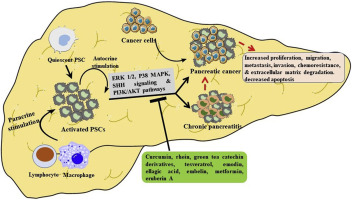Acta Pharmaceutica Sinica B ( IF 14.7 ) Pub Date : 2019-11-14 , DOI: 10.1016/j.apsb.2019.11.008 Puvanesswaray Ramakrishnan , Wei Mee Loh , Subash C.B. Gopinath , Srinivasa Reddy Bonam , Ismail M. Fareez , Rhanye Mac Guad , Maw Shin Sim , Yuan Seng Wu

|
Activated pancreatic stellate cells (PSCs) have been widely accepted as a key precursor of excessive pancreatic fibrosis, which is a crucial hallmark of chronic pancreatitis (CP) and its formidable associated disease, pancreatic cancer (PC). Hence, anti-fibrotic therapy has been identified as a novel therapeutic strategy for treating CP and PC by targeting PSCs. Most of the anti-fibrotic agents have been limited to phase I/II clinical trials involving vitamin analogs, which are abundant in medicinal plants and have proved to be promising for clinical application. The use of phytomedicines, as new anti-fibrotic agents, has been applied to a variety of complementary and alternative approaches. The aim of this review was to present a focused update on the selective new potential anti-fibrotic agents, including curcumin, resveratrol, rhein, emodin, green tea catechin derivatives, metformin, eruberin A, and ellagic acid, in combating PSC in CP and PC models. It aimed to describe the mechanism(s) of the phytochemicals used, either alone or in combination, and the associated molecular targets. Most of them were tested in PC models with similar mechanism of actions, and curcumin was tested intensively. Future research may explore the issues of bioavailability, drug design, and nano-formulation, in order to achieve successful clinical outcomes with promising activity and tolerability.
中文翻译:

针对胰腺星状细胞的选择性植物化学物质,作为慢性胰腺炎和胰腺癌的新型抗纤维化剂
活化的星状细胞(PSC)已被广泛接受为过度胰腺纤维化的关键前体,胰腺纤维化是慢性胰腺炎(CP)及其强大的相关疾病胰腺癌(PC)的重要标志。因此,抗纤维化疗法已被确定为通过靶向PSC来治疗CP和PC的新型治疗策略。大多数抗纤维化剂仅限于涉及维生素类似物的I / II期临床试验,该试验在药用植物中非常丰富,并已证明对临床应用很有前途。作为新的抗纤维化剂,植物药已被用于多种互补和替代方法。这篇评论的目的是针对选择性的新潜在抗纤维化药物(包括姜黄素,白藜芦醇,大黄酸,大黄素,绿茶儿茶素衍生物,二甲双胍,eruberin A和鞣花酸,用于对抗CP和PC模型中的PSC。它旨在描述单独或组合使用的植物化学物质的机理以及相关的分子靶标。它们中的大多数都在具有相似作用机理的PC模型中进行了测试,姜黄素也经过了严格的测试。未来的研究可能会探讨生物利用度,药物设计和纳米制剂的问题,以期取得成功的临床结果并具有良好的活性和耐受性。对姜黄素进行了严格的测试。未来的研究可能会探讨生物利用度,药物设计和纳米制剂的问题,以期取得成功的临床结果并具有良好的活性和耐受性。对姜黄素进行了严格的测试。未来的研究可能会探讨生物利用度,药物设计和纳米制剂的问题,以期取得成功的临床结果并具有良好的活性和耐受性。
















































 京公网安备 11010802027423号
京公网安备 11010802027423号